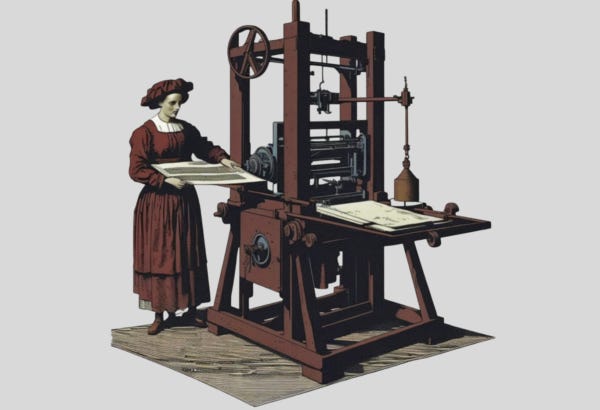Published? Yes Please!
From query letters to taking control: why I’m starting my own publishing company.
For over five years, I’ve tried to do things the “proper” way when it comes to getting my books published.
I researched agents. I entered competitions. I attended webinars and conferences about “standing out in the slush pile,” which mostly involved advice like “use spellcheck” and “don’t be weird in your cover letter.” Dutifully, I wrote my stories and polished them. I followed submission guidelines as though they were sacred scrolls. Always waiting, always hoping.
And nothing happened.
Well, I say nothing. I collected plenty of polite rejections. A few ghostings. After one seemingly successful near hit, one agent re-requested a revised full manuscript and then promptly went into hiding once she received it. I tried not to take that so personally.
I felt I had to decide whether I wanted to keep up this punishing performance, or stop refreshing my inbox and start refreshing my expectations.
And this year, I did something unexpected. I stopped asking for permission and started giving it to myself.
Not just to self-publish, but to create my own publishing company.
Introducing: Messy Robot Books.
A name that captures both my day job in cybersecurity and the robot vacuum that I’m building a series of picture books on.
No, I haven’t registered the company yet. One step at a time. I’m not emotionally prepared to engage with VAT, spreadsheets, or tax submissions quite yet. However, as of this week, the web domain is mine, and the intent is real.
Why this way?
Honestly, I was nudged over the edge by a combination of frustration and inspiration. The frustration of waiting for doors to open that never quite did. And the inspiration of seeing other writers on Substack sharing their journeys, not just the glossy book launches, but the challenging middle bits. I read about the pivots and rethinks. I absorbed the quiet moments of, “Hang on, what if I did this differently?”
And once I let myself ask that question, I realised how much I liked the answer.
Because for the first time in a long time, I felt in charge of my writing life. Not just the creating part, but the what-happens-next part. The production and branding. It’s up to me alone to get my books published. It also meant I removed the elements of someone else’s likes, dislikes, priorities, and timeline as barriers on my road to publication. It was removing the gatekeepers who never opened the gate for me. Now, I’ll let the public decide.
Of course, going solo isn’t the easy route. But it is, in many ways, the more honest one for me right now.
Thinking of Doing the Same? Here’s a Quick Rundown
Pros of Starting Your Own Publishing Company:
Total creative control. From font choices to foil stamping to how weird your robot character can get.
Total brand control. With print-on-demand (POD) alone, your books sit under their publishing imprint (like "Independently published" on Amazon). With your own company, you choose:
A publisher name that reflects your brand.
A consistent logo on your spines and copyright pages.
A clear identity readers and retailers can recognise across titles.
You decide the pace. No more waiting 8 months for a reply that says, “not for us.”
Wider distribution options: when you run your own publishing company, you can:
Use multiple platforms (Amazon, IngramSpark, Bookvault, or even direct-to-customer from your website)
Approach indie bookshops or chains directly with your own publisher details
Work with wholesalers/distributors down the line if you scale
Professionalism and perception. Retailers, libraries, and press outlets often sniff at anything marked “self-published.” A proper publishing company with an ISBN block, company name, and metadata listings makes you look more credible.
More profit per book (if you sell them, of course).
You get to say you’re a publisher, which sounds quite impressive at dinner parties.
Cons of Starting Your Own Publishing Company:
You’re the boss, the intern, the sales and marketing team, and the IT support.
Upfront costs. ISBNs, illustrators, print runs. The costs aren’t shy.
Steep learning curves. There’s a reason other people study publishing.
No built-in distribution or marketing machine. You are the machine.
You have to be okay with figuring it out in public (gulp).
So that’s where I am. Somewhere between naïve optimism and spreadsheets I haven’t made yet. But I’m excited. Because the books are coming. And, this time, I’m not waiting for anyone else to say yes.
Just me, my naive yet optimistic gung-ho-ness, and a very messy robot.
As a side note, I also want to recognise and thank who put this whole idea into my head. He left a very thoughtful comment for me after a notable rejection I’d received. I had started to ponder taking control and self-publishing. I just hadn’t considered building the actual publishing company! If left me excited to explore what else was out there and not just to settle for what’s offered. Thank you, thank you, thank you, Tom. Substack communities are so valuable for this reason.
For any other readers, I’d love to know any tips or tricks you’ve learned during your journeys.






I've done that, twice.
It's a great adventure, and I've met lots of interesting people, and I love having complete control over everything.
However, to make money does involve a lot of work. If you look at my website, you will see the books I have published.
My first two books sold over 10,000 copies in hardback that was back in the 1980s. It is much more difficult now. I wish you all the luck in the world. I would send you one of my books, but the only ones are used, in bookshops – hundreds of them!
Wishing you all the best in starting your own publishing company!! That’s exciting! ☺️